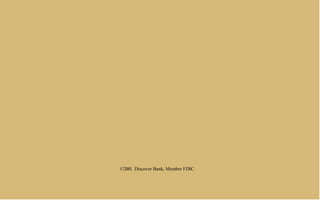This document provides an overview of how credit cards work and important terms and concepts related to using credit cards. Some key points covered include:
- Credit cards allow you to borrow money from the card issuer to make purchases and pay them back later, with interest charged if not paid in full.
- Annual Percentage Rate (APR) is the interest rate charged on balances, typically calculated monthly. Higher APR means more interest paid over time.
- Important terms in credit card agreements include grace periods, minimum payments, fees, and differences in APR for purchases vs cash advances.
- Maintaining good credit by paying on time is important for future loans and credit limits, while late payments can negatively
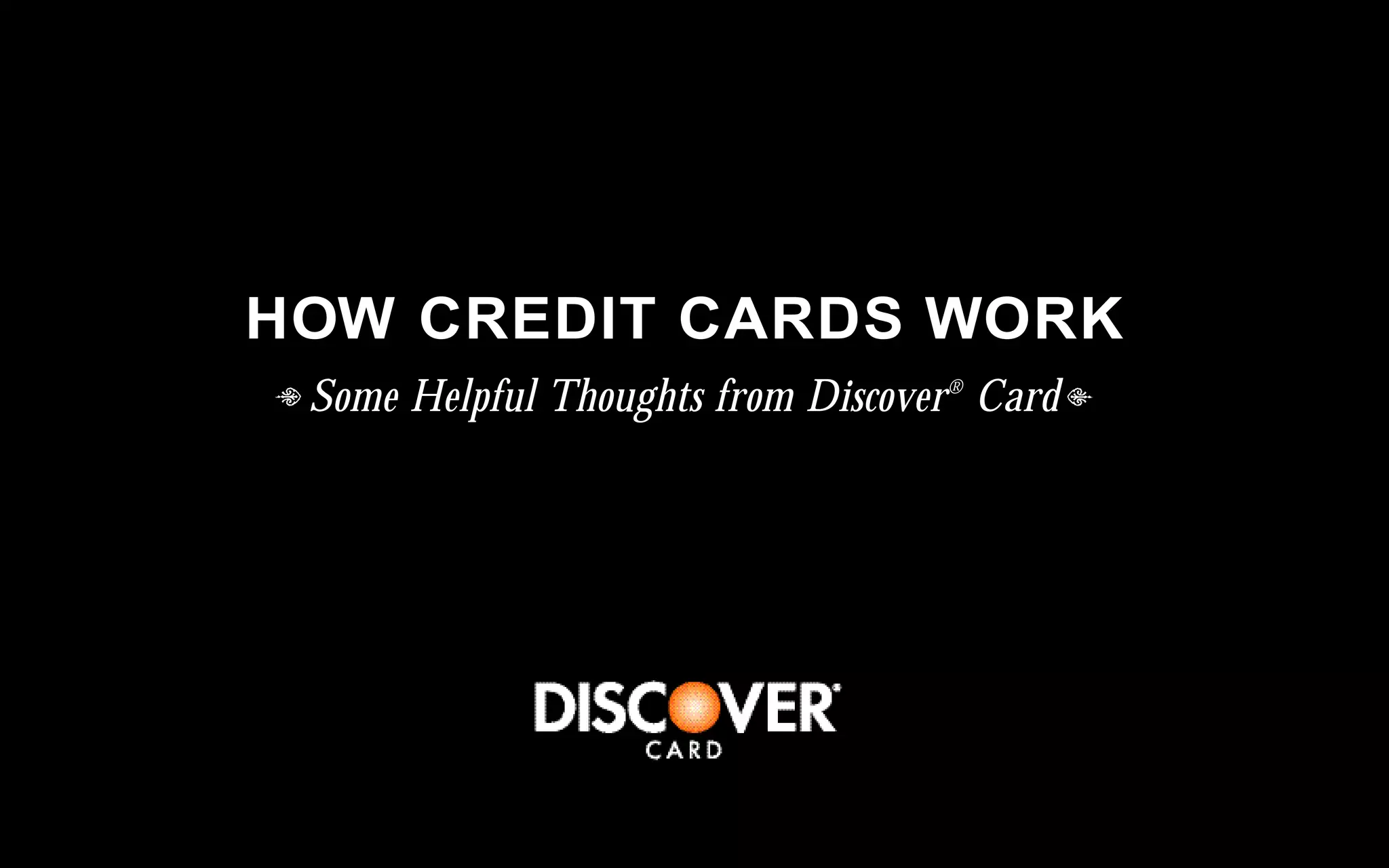
![CONTENTS
[ 1 ] . Why we wrote this book ..................................................................... 3
[2 ] . Why having good credit matters ......................................................... 9
[ 3 ]. The toughest nut to crack: What’s APR? ............................................. 15
[4 ] . The basics: What you need to know to use your card wisely ................ 21
[ 5 ] . Rules of the road: What happens when ................................................ 29
[ 6 ] . Smart things to do ............................................................................... 35
[ 7] . How do credit card companies make money? ....................................... 39
[ 8 ] . A few words about Discover® Card ....................................................... 43](https://image.slidesharecdn.com/howtousediscover-120701150225-phpapp01/85/Howtousediscover-2-320.jpg)
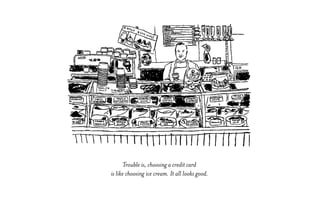
![Why we wrote this book.
Because credit cards are way too confusing these days—
and Discover ® Card wants to make them easier.
When you really stop to think about it, you have to admit, credit cards are still one
of the world’s coolest inventions.
To purchase something you want, all you have to do is carry this small card around,
hand it over to people, sign your name on a little piece of paper, and then walk away with
a couple of new CDs, a leather jacket, or a stomach full of deep dish pizza, whatever.
It’s enormously convenient. It’s safer than cash. It helps you build a strong credit
[ 3]](https://image.slidesharecdn.com/howtousediscover-120701150225-phpapp01/85/Howtousediscover-4-320.jpg)
![history. And it’s very helpful—particularly when it comes to more significant purchases
that you need but can’t quite afford in one big payment: a sofa, a bed, a new clutch. The
freedom to buy these things now, and then pay them off later, is, well, a pretty
remarkable thing.
However, what’s not so remarkable is getting the bill and not truly understanding
what you’re looking at—that is, where the finance charge came from, what happened to
that nice introductory rate, or what could happen if you don’t pay right away.
Of course, these things were never especially easy to understand. But today, given the
vast number of credit cards, each with their own way of doing things, it’s even tougher
than before.
If you were to compare the umpteen number of credit card offers you get in the mail,
[4]](https://image.slidesharecdn.com/howtousediscover-120701150225-phpapp01/85/Howtousediscover-5-320.jpg)
![you’ll find about as many rules and regulations as you do cards to choose from. And, to
confuse you even more, these rates and rules can change based on everything from the
world economy to whether or not you pay your bills on time.
So, while we can’t wave a magic wand and instantaneously simplify our whole
industry we can, at the very least, take the initiative to explain credit card rules more
simply—which is what gave us the idea for this little book.
Just in case you’re worried, we’re not doing this to fill you in on every little detail of
how credit cards work.
We’re doing this to make sure you’ve got the bare-bones knowledge you need both
to ask the right questions when you’re choosing a card, and to understand the rules when
you’re using a card—any card.
[5]](https://image.slidesharecdn.com/howtousediscover-120701150225-phpapp01/85/Howtousediscover-6-320.jpg)
![The point is, credit cards are so much a part of our lives, so convenient for small
purchases and so helpful when it comes to larger purchases, that we don’t always
appreciate their power.
They are also one of the most potent tools around for building a strong credit history.
That’s why we all just have to be careful not to abuse them. Too much of a good thing is
bad for anybody.
So, sit yourself down, grab a beverage, and prepare to get smart.
[6 ]](https://image.slidesharecdn.com/howtousediscover-120701150225-phpapp01/85/Howtousediscover-7-320.jpg)
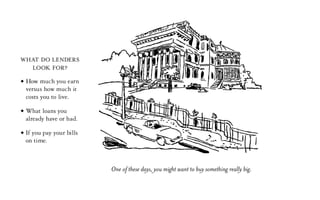
![Why having good credit m atters.
Because it’s the best way to prove to lenders you’re trustworthy.
If you’ve already purchased a car or a house, then you probably know the power of a
good credit report and the perils of a bad one. It’s just uncanny how many basic details
of your credit history can fit onto one 8-1/2 x 11 sheet of paper.
And you probably find it annoying that the bank that’s thinking about giving you a
home loan would insist you write a letter explaining why you never paid the $32.56 bill
you owed (Was it shoes or underwear?) on that department store card you must have lost
and forgotten about. Besides, how did the bank find this out?
[9]](https://image.slidesharecdn.com/howtousediscover-120701150225-phpapp01/85/Howtousediscover-9-320.jpg)
![The bank found out because they asked the credit bureaus. The bureaus know because
they’ve been keeping a record of your credit habits ever since you started buying things on
credit. Whenever you apply for a loan to buy anything big—a house, a car, a boat, a piece
of furniture—the bureaus report back what they’ve recorded over the years, which is: How
responsibly you pay your bills over time—mortgages, credit cards, car loans, and so forth.
In fact, the credit bureaus have even developed a nifty rating system to give potential
creditors a picture at a glance of just how creditworthy you are. But before you get fussy
about being rated, think of the rating system this way: You’re born onto this earth with
no credit history at all. Nothing. Zip. Nada. So, the only one who can make it good, or
really screw it up, is you. (Sorry. We had to point that out.)
It gets good when you’re good—when lenders extend you credit and you pay them
[10]](https://image.slidesharecdn.com/howtousediscover-120701150225-phpapp01/85/Howtousediscover-10-320.jpg)
![back on time. This is actually where having a credit card comes in handy—to help build
that good credit history. Because here’s an interesting twist: If you have no history, you
have no rating—which means you could conceivably get a poor credit rating, simply
because there’s nothing to report. There’s nothing bad on your report, but there’s also
nothing good, so lenders have no criteria on which to base a decision.
A good credit report is sort of like having a 4.0 GPA. Everybody trusts you. A bad
one is like getting a few Fs on an otherwise reasonably good transcript. People can’t help
but wonder. And just like a bad grade, such a transgression sticks with you for a long
time. Once it’s done, it’s done.
There is a logic to the process, you know. Not knowing you personally (that is,
whether you’re a budding Nobel laureate or a committed slacker), the only way a
[11]](https://image.slidesharecdn.com/howtousediscover-120701150225-phpapp01/85/Howtousediscover-11-320.jpg)
![financial institution can know you is to look at your past.
They surmise (and reasonably so) that if you manage to pay your small bills on time,
you’ll make the same effort to pay your big bills on time. On the other hand, if you don’t
pay the small ones, well, it just doesn’t bode well for the big ones.
The good news? All you have to do to win the credit game is pay your bills on time—
if you can’t pay the entire bill, pay at least the minimum payment. Pretty easy really.
(And besides, you don’t want to be explaining to your friends that you didn’t get your
home loan because you ran off with some store’s underwear a few years ago, now do you?)
So what happens if you get a blemish on your credit record? If you’re denied credit
by a lender or a merchant based on a bad report they received on you, you’re entitled to
a free copy of that report. Don’t panic yet. Wait till you see the report. There could be an
[12 ]](https://image.slidesharecdn.com/howtousediscover-120701150225-phpapp01/85/Howtousediscover-12-320.jpg)
![error. It’s happened before. And if there is an error, it’s correctable. You just have to
contact the credit bureau and work with them to get it right. Or, if you’re just curious,
you can order a copy for, yep, you guessed it, a small fee (although in some states it’s free).
Credit bureaus have to send the report to you within 30 days. That’s the law.
The three largest credit bureaus:
Experian Trans Union Equifax
P.O. Box 2106 P.O. Box 390 P.O. Box 740241
Allen, TX 75013-2106 Springfield, PA 19064 Atlanta, GA 30374-0241
800-422-4879 or 800-916-8800 800-685-1111
800-682-7654 Transunion.com Equifax.com
Experian.com
[13]](https://image.slidesharecdn.com/howtousediscover-120701150225-phpapp01/85/Howtousediscover-13-320.jpg)
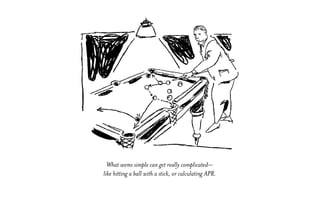
![The toughest nut to crack: What’s APR?
To all the financial wizards out there,
go walk the dog or eat a pizza. This is going to take a minute.
Hey, if it was so simple, everybody would already understand it, right? Let’s start
with the basics:
In the simplest of terms, a credit card is a loan. You’re the borrower, the credit card
issuer is the lender. When you buy something, the credit card issuer pays the store or
whomever on your behalf, and then sends you a bill around the same time each month.
Essentially, you have borrowed money from the credit card issuer. And even though
[15]](https://image.slidesharecdn.com/howtousediscover-120701150225-phpapp01/85/Howtousediscover-15-320.jpg)
![you’re usually given a little time (called a grace period) to pay this money back before
they start charging you interest, you will eventually have to pay the issuer something if you
don’t pay them back immediately; that is, if you carry a balance.
That something is called a finance charge—a small amount you pay for what is, as we
said, borrowing money. The amount you’re charged is determined by a pre-set percentage
rate—called APR, or Annual Percentage Rate. Here’s how it works.
Say the APR on your credit card is 18%. Typically, credit cards calculate that rate on
either a daily or monthly basis—which means pretty much what it says. The daily rate
is calculated on your daily balance and the monthly rate on your balance at the end of the
month. Either way, it means you pay a small fee for borrowing the money.
For example, say you charge $750 for a new computer. A few weeks later, you get your
[16]](https://image.slidesharecdn.com/howtousediscover-120701150225-phpapp01/85/Howtousediscover-16-320.jpg)
![bill and you go, nah, I’ll just pay the minimum, because now I need a printer. This is
when the finance charge kicks in, and if your card works on a monthly basis, you’re
charged 1-1/2% interest on $750, less the minimum payment.
Where did the 1-1/2% come from? That’s 18% divided by 12, as in 12 months. (In
other words, 18 divided by 12 equals 1.5.)
Next month when you get your bill, assuming you made your minimum payment of
say, $15 (and kept your card in your wallet and didn’t buy a bunch of computer games to
run on your computer), $12 pays the interest and $3 reduces the $750 down to $747—which
doesn’t seem like much progress, and it’s not. In fact, this is where APR can get tricky.
If you only make the minimum payment each month, most of your money goes
toward paying off the finance charge—the amount you’re being charged on the money
[17]](https://image.slidesharecdn.com/howtousediscover-120701150225-phpapp01/85/Howtousediscover-17-320.jpg)
![you’ve effectively borrowed to buy the computer. So, if you borrow the money for a long
time, you would end up paying far more for the computer than you originally intended.
This is why people care about APR. And this is why it’s far more responsible—not
to mention just smart business—to pay not only the minimum payment but as much as
you can.
[18]](https://image.slidesharecdn.com/howtousediscover-120701150225-phpapp01/85/Howtousediscover-18-320.jpg)
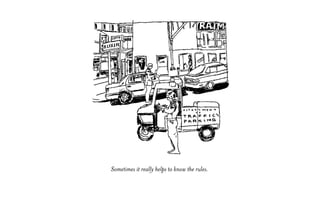
![The basics: What you need to know
to use your card wisely.
Everything you need to know, but didn’t know to ask.
First, what’s all that stuff in the fine print? Do I really have to read it? Well, as it
turns out, there’s a whole bunch of stuff in fine print—some of which you really need to
read. Some of it explains the nitty gritty details of how your bill is calculated, some of it
spells out what happens if you don’t pay on time, and some of it goes through legal
requirements—a lot of which is designed to protect you.
To help simplify things, on the following pages we’ve put together a list of the key
[21]](https://image.slidesharecdn.com/howtousediscover-120701150225-phpapp01/85/Howtousediscover-20-320.jpg)
![attributes that make up the terms of credit cards. Hopefully, this will help you sort
through the fine print and evaluate your options.
1. What kind of APR am I being charged?
Variable Rate: Like it says, your rate varies—based on big financial indexes such as the
Prime Rate offered by our nation’s largest banks (or even stranger indexes such as LIBOR).
This means, of course, that your rate can travel up or down each month, depending on
whatever happens to be influencing the domestic or even the world economy.
Fixed rate: Your rate is fixed, meaning you’re given a precise number, say 12.9% or
14.9% or whatever, that the credit card issuer will stick to each month, no matter what
[22]](https://image.slidesharecdn.com/howtousediscover-120701150225-phpapp01/85/Howtousediscover-21-320.jpg)
![changes may occur in the world economy or the big financial indexes. Card issuers can
still change this rate, but they’re required by law to tell you first and give you the option
of saying “No!” and canceling your card. Be aware, however, that some cards may appear
to have “fixed rates,” yet when you read the fine print, you find that these fixed rates will
automatically increase if you make late payments.
2. What can make APR more complicated?
Promotional or introductory rates: Many cards start with low introductory rates that
eventually move to a higher rate. Make certain you know when the higher rate kicks in
and how much it is.
[ 23]](https://image.slidesharecdn.com/howtousediscover-120701150225-phpapp01/85/Howtousediscover-22-320.jpg)
![Different APRs for different transactions: For example, a cash advance is usually
charged at a higher rate and the finance charge starts immediately. The logic? The credit
card issuer is giving you cash right there on the spot, which, from where they sit, is
riskier, so they charge you for it.
Risk pricing: If you’re late a certain number of times, you may be charged a higher rate.
The logic is, poor payers are far more likely to default on a loan. To avoid having to charge
good customers higher rates to compensate for the bad behavior of a few, the credit card
issuer simply charges the less dependable customers the higher interest. Seems fair, don’t
you think?
[24]](https://image.slidesharecdn.com/howtousediscover-120701150225-phpapp01/85/Howtousediscover-23-320.jpg)
![3. Is there any rule of thumb about fees?
Here’s the deal: Most credit card issuers charge fees if customers violate the terms of
their agreement. Essentially, they encourage good financial behavior by penalizing bad
behavior. This is why they may charge you for things like: “late payment,” “returned
checks,” or for charging “over your credit limit.”
4. What are the rules for cash advances?
x First, virtually all issuers charge a fee or a set percentage when you take a cash advance.
x There’s usually a different and lower limit to how much cash you can draw compared
to how much you can charge on your card.
x There’s usually a different and possibly higher APR for cash advances than for purchases.
[25]](https://image.slidesharecdn.com/howtousediscover-120701150225-phpapp01/85/Howtousediscover-24-320.jpg)
![5. What is a “grace period,” or a “free period”?
x A grace period is the precious period of time between when you make a purchase and
when your payment is considered due. By law, credit card issuers must mail your
statement at least 14 days before the due date to give you time to pay.
x A grace period means that if you pay your balance on time and in full, you’ll never pay
any finance charges (except, of course, for a cash advance, which may accrue interest
immediately). Sort of like a free loan.
x If, however, you have carried a balance over from the prior month, you will not enjoy
a grace period.
x Be warned, not all credit cards have a grace period.
[ 26]](https://image.slidesharecdn.com/howtousediscover-120701150225-phpapp01/85/Howtousediscover-25-320.jpg)
![6. How is my “minimum payment due” calculated?
Your minimum payment due is determined by your credit card issuer, but it typically
runs at about 2% to 3% of your balance. If you miss a payment, you’ll have to pay the
minimum due for every month missed before you get back into the lender’s good graces.
[27]](https://image.slidesharecdn.com/howtousediscover-120701150225-phpapp01/85/Howtousediscover-26-320.jpg)
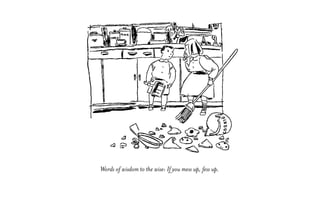
![Rules of the road: What happens when.
Here it is in plain English—the good, the bad, and the ugly.
You pay on time: All kinds of good things transpire, not the least of which is you don’t
have to carry that nagging little morsel of guilt around with you. If you pay at least the
minimum payment on time, you’ll probably get a good credit rating—very helpful when
buying a car or house, applying for a new card, and in life in general. In time, you’ll
probably even get a higher credit limit, because you’ve proven yourself worthy and people
trust you. It’s nice to be worthy.
[29]](https://image.slidesharecdn.com/howtousediscover-120701150225-phpapp01/85/Howtousediscover-28-320.jpg)
![You’re late: One time isn’t so bad—except that, in our experience, bad habits grow like
a fungus. And beware! Being even as little as 30 days late can, yuk, affect your credit
rating. The best strategy to follow: If you are late once, be sure to pay up as soon as
possible. Most credit card issuers will be understanding if you catch up fast. But, they’ll
still charge you a fee.
You’re really, really late: The credit card issuer gets nervous. Look at it this way: You
loan your friend $250, which he or she promises to pay back in a couple of weeks. Then
he or she doesn’t, and then doesn’t some more, and then won’t even return your phone
calls. Credit card critics will tell you this is just the behavior credit card issuers relish,
because they get to charge you interest. But the truth is, credit card issuers prefer you to
[30]](https://image.slidesharecdn.com/howtousediscover-120701150225-phpapp01/85/Howtousediscover-29-320.jpg)
![pay. All issuers charge interest, sure, but there’s a huge difference between using your card
and abusing your card—something which isn’t good for anybody. All things being equal,
it’s best if you pay.
You mess up: You get so in debt, you can’t even make the minimum payment. Please.
Don’t just stick your head in the sand. Call the credit card issuer. If you don’t pay,
eventually they’ll suspend your charging privileges. And then if you still don’t pay—
geez, this is too painful to talk about—they’ll turn you over to their collection
department, who will report you to the credit bureaus who, in turn, will record your
transgression and here’s the worst of it, communicate your misstep to future lenders.
(Let’s just not go there.)
[31]](https://image.slidesharecdn.com/howtousediscover-120701150225-phpapp01/85/Howtousediscover-30-320.jpg)
![You lose your card: Not a problem, or at least not a big one. Just call the credit card
issuer. If you call them right away, most won’t hold you liable for any fraudulent charges.
If it’s after use, some cards hold you liable for up to $50.
Somebody steals it: Ditto the above.
You get charged for something you didn’t buy: Either call the credit card company or
let them know in writing (that’s what most issuers require) within 60 days of receiving
your statement. Do all the normal stuff like include your name, account number, a
description of the item, the amount, the date of the transaction, and why you disagree.
You can even withhold payment on the disputed amount while they sort out the
[32]](https://image.slidesharecdn.com/howtousediscover-120701150225-phpapp01/85/Howtousediscover-31-320.jpg)
![confusion, and they won’t charge you any interest if the dispute is settled in your favor.
You send too much money: Unless you instruct otherwise, the credit card issuer will
just apply a credit to your account. If you want the money back, they’ll gladly send it,
provided it’s more than a dollar, as in, worth the postage. You should get your refund
within seven days after the issuer receives your request. That’s the law. And if the credit
stays on your account more than six months, the issuer has to send you a check. That’s
also the law.
[ 33]](https://image.slidesharecdn.com/howtousediscover-120701150225-phpapp01/85/Howtousediscover-32-320.jpg)
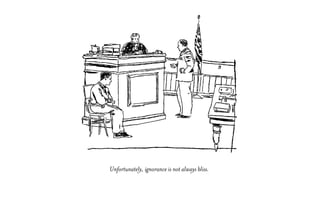
![Smart things to do.
We’re not trying to be your mother, just give you a little free advice.
x Make sure you understand the terms of your credit card—the APR, the fees, all the
stuff we’ve been talking about. (Sorry, you do need to read the fine print.)
x Don’t be leaving your receipts on the restaurant table or throwing them in an open
trash bin. Hold onto them in case there’s a scoundrel lurking around who’s into fraud
or there’s something on your statement you don’t recall.
[35]](https://image.slidesharecdn.com/howtousediscover-120701150225-phpapp01/85/Howtousediscover-34-320.jpg)
![x Pay your bills when you get them to avoid late fees.
x Keep a file (in a safe place) of all account numbers, expiration dates, and phone
numbers so you can call the credit card issuer the minute you lose your card.
x Be vigilant. Check your statement each month to make sure the purchases are all yours.
In other words, make certain there’s nothing on it that belongs to some other card holder.
x Don’t be rattling your account number off over the phone to callers you’re not familiar
with, and as for the Web, make sure the site uses a secure server.
[ 36]](https://image.slidesharecdn.com/howtousediscover-120701150225-phpapp01/85/Howtousediscover-35-320.jpg)
![x Check out student credit cards. It’s actually a very good idea for students to have their
own credit cards in their own names. Student cards tend to have lower credit lines,
which helps young people learn to use cards in a more controlled setting and, at the
same time, start building their own credit histories.
x And above all, if you do charge too much and get in over your head, don’t go into
denial. Call the people you owe money and tell them you’re in a bind. Most will be glad
(or at least willing) to work out an arrangement. Then, stop charging stuff, consolidate
your debt (one tidy number is better than a bunch of little ones), and consider
counseling (give it a chance, you might meet somebody as wild and free as yourself).
[37]](https://image.slidesharecdn.com/howtousediscover-120701150225-phpapp01/85/Howtousediscover-36-320.jpg)
![How do credit card companies
make money?
To understand this, you have to understand the industry.
And we’re sorry about that, because the American credit card industry is, well, it’s a
little tough to explain. But hold on, we’re going to do it.
First, you’ve got the credit card companies, such as Discover Card, Visa, MasterCard,
American Express, which are generally referred to as “networks.” Then you’ve got the
banks that issue these cards, referred to as “issuers.”
But, as you may know already, Discover Card and American Express are a different
[39]](https://image.slidesharecdn.com/howtousediscover-120701150225-phpapp01/85/Howtousediscover-37-320.jpg)
![kind of network. While Visa and MasterCard are associated with hundreds of member
banks around the country which issue their own unique versions of these cards, Discover
and American Express currently operate through their own bank—so they are both
network and issuer all rolled into one. Big difference.
However, putting who owns what aside for a minute, when you talk about credit card
companies, you’re still talking about two things: networks (the credit card company) and
issuers (the financial arm, or the bank that carries the loan).
The issuers charge cardholders interest on their purchases and cash transactions. Some
issuers also charge you an annual fee just for the privilege of carrying their card. And all
issuers pick from a range of potential fees—for cash advances, late payment, and so forth.
Credit card companies also make some money from the merchant side. When you use
[40]](https://image.slidesharecdn.com/howtousediscover-120701150225-phpapp01/85/Howtousediscover-38-320.jpg)
![your card at a store, for example, they charge that store a fee for each credit card sale. This
money goes to the network, the issuer, and others in between.
MasterCard and Visa also make money by charging the banks who issue their cards
an “association fee”—that is, a fee to be “associated” with them.
Did you get all that? Hey, you could drop these tidbits at a cocktail party and look
financially suave.
[ 41]](https://image.slidesharecdn.com/howtousediscover-120701150225-phpapp01/85/Howtousediscover-39-320.jpg)
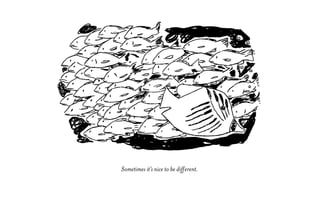
![A few words about Discover Card.
You may not have noticed yet,
but we’re not like other credit card companies.
We’re not trying to make a big pitch for the Discover Card—that would certainly
spoil the point of this book, which is written to be a simple and objective tool.
But, we do want to tell you a few things about us that you may not know and might
not easily find out—then you can judge for yourself whether these things matter to you
or not.
Try this little experiment: At your next party, whenever you sense a lull, instruct all
[43]](https://image.slidesharecdn.com/howtousediscover-120701150225-phpapp01/85/Howtousediscover-41-320.jpg)
![your friends to pull out their wallets and fork over the nation’s four major cards—
Discover Card, Visa, MasterCard, and American Express. Now, lay those cards face up on
the table, tell everybody to pay attention, and ask the question: Which one doesn’t fit in?
We wager your friends will pick Discover Card every time. We also wager that not
one of them will have a clue as to why. Now, you might think that being viewed as
“different” from the other guys would bother us. But actually that’s the part we like.
Mind if we tell you why? It’ll only take a second.
First, we’re younger than the other guys—13 years is young by credit card standards.
By the time we entered this business, our competitors were already entrenched, so we had
to do a few things differently just to get into the game. Our claim to fame is that we
became the first major card not to charge an annual fee and the first to pay you for using
[44]](https://image.slidesharecdn.com/howtousediscover-120701150225-phpapp01/85/Howtousediscover-42-320.jpg)
![our card—a practice we invented called “Cashback Bonus® Award.”
Over time our competitors have adopted bits and pieces of these practices but there’s
still one characteristic that we think distinguishes our way of doing business, and it’s one
we touched on earlier on page 40.
Unlike our two biggest competitors, who operate through hundreds of different
lenders or “issuers” in far flung places all over the country, we are essentially both—
network and issuer—all in one. Visa and MasterCard are a consortium of thousands of
banks. We’re one bank. One company.
Our home is Chicago. We have U.S. customer service centers in Salt Lake City,
Phoenix, and Wilmington (Delaware). That’s it. That’s us.
Being all-in-one like this, it’s second nature for us to think, work, and act as a single
[ 45]](https://image.slidesharecdn.com/howtousediscover-120701150225-phpapp01/85/Howtousediscover-43-320.jpg)
![unit—which means we can very easily solve complex problems, commit to fixed rates,
resolve disputes over the phone, send friendly e-mail reminders when you get near your
credit limit (if you want us to), and basically do all sorts of things that make using our
card, at least, a more straightforward and pleasant experience.
There. That’s all we wanted you to know.
[46 ]](https://image.slidesharecdn.com/howtousediscover-120701150225-phpapp01/85/Howtousediscover-44-320.jpg)
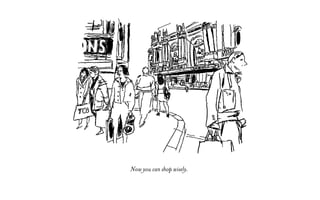
![Enjoy.
We hope this little book enlightened you a bit. If you have any additional questions—
and you want to talk to somebody about them—feel free to call us at 1-800 -Discover.
Or check us out on the Web at discovercard.com.
[48 ]](https://image.slidesharecdn.com/howtousediscover-120701150225-phpapp01/85/Howtousediscover-46-320.jpg)
